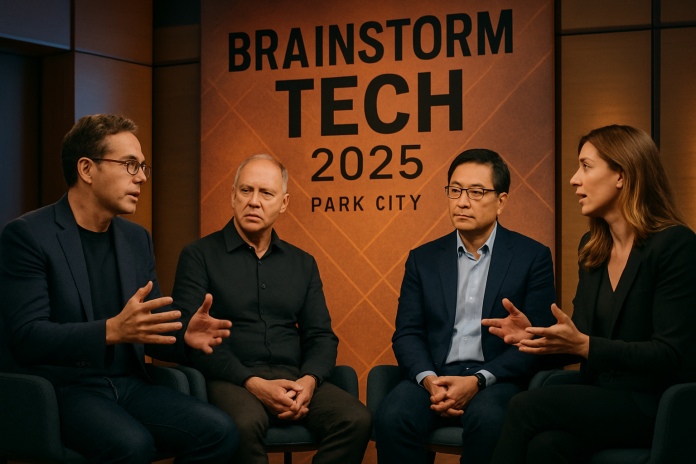Leading technology executives are balancing artificial intelligence expansion with geopolitical supply chain complexities, as revealed during discussions at the recent Brainstorm Tech conference in Park City, Utah. According to Shoaib Makani, Founder and CEO of Motive, “These tariffs are not, paradoxically, high enough for us to nearshore,” illustrating the intricate economic calculations behind modern supply chain decisions.
Supply Chain Strategies Under Geopolitical Pressure
The convergence of AI advancement and geopolitical tensions presents unprecedented challenges for business leaders navigating global operations. John W. Mitchell, President and CEO of the Global Electronics Association, emphasized that companies require long-term policy consistency to effectively plan strategic investments. Faced with shifting 4-year governmental changes, businesses increasingly seek more stable operational environments abroad.
Jennifer Ives from the Partnership for Public Service advocated for a balanced approach to AI regulation, noting the critical need for more nuanced policy conversations that account for business realities while addressing legitimate concerns about AI deployment.
Walmart’s AI-Driven Workforce Evolution Model
Walmart’s approach to AI integration offers a blueprint for large-scale workforce transformation without mass displacement. U.S. CEO John Furner stated, “We’ll have roughly the same number of people,” emphasizing AI’s role in extending careers and improving job quality rather than eliminating positions. This strategy reflects a broader industry trend of retraining employees for AI-augmented roles, ensuring workforce evolution aligns with technological advancements while maintaining employment stability.
The retail giant’s model demonstrates how AI can enhance productivity through employee empowerment rather than replacement, providing a framework other enterprises can adapt across sectors.
Venture Capital Perspectives on AI Market Dynamics
Venture capitalists Dana Settle and David Krane expressed both optimism and caution regarding AI’s accelerated development pace at Brainstorm Tech. Krane remarked, “We’re at Formula One speeds,” indicating unprecedented growth opportunities juxtaposed with significant capital allocation challenges in an increasingly competitive landscape.
The venture capital perspective highlights the delicate balance between aggressive AI investment and prudent risk management, as firms navigate market saturation concerns while pursuing breakthrough innovations.
Strategic Risk Mitigation Framework
Executives outlined three critical areas for organizational preparation: skill development investments, geopolitical risk planning, and regulatory engagement strategies. The discussions revealed that successful AI adoption requires comprehensive workforce retraining programs that prepare employees for enhanced roles rather than displacement.
Companies must also develop robust strategies to mitigate supply chain disruptions prompted by geopolitical tensions, while actively engaging in industry discussions to positively influence AI-related regulatory frameworks.
For Business Leaders
- Invest in training: Allocate resources for ongoing employee AI tool education and skill development programs.
- Plan geopolitical risks: Develop comprehensive strategies to mitigate supply chain disruptions from international tensions.
- Engage regulation: Participate actively in industry discussions to shape favorable AI regulatory frameworks.
HOWAYS Insight
- Venture capital funding will continue driving AI growth, but strategic allocation becomes crucial to avoid market oversaturation.
- AI adoption patterns in healthcare and legal sectors provide proven blueprints for implementation across other industries.
Balancing Innovation with Operational Stability
The Brainstorm Tech dialogues underscore how AI advancement and geopolitical considerations have become inseparable factors in modern business strategy. As companies navigate these dual complexities, the emphasis on flexibility and strategic foresight becomes paramount for maintaining competitive advantage while managing operational risks.
Successful organizations will distinguish themselves through their ability to leverage AI for sustainable growth while responsibly managing geopolitical uncertainties and regulatory compliance requirements.




